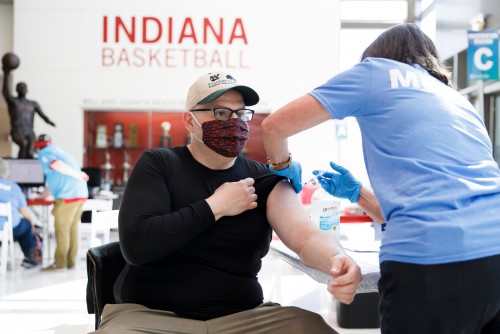Researchers determined that COVID-19 death reductions associated with vaccination from Dec. 21, 2020 to May 9, 2021 resulted in an economic value of $625 billion to $1.4 trillion. Photo by James Brosher, Indiana University
A new study by Indiana University and RAND Corp. researchers assessed the impact of COVID-19 vaccination and found that 139,393 deaths were prevented during the first five months of vaccination efforts in the United States. The study was published in Health Affairs.
"Even in the early stages of the vaccination rollout, when the number of fully vaccinated people was relatively low, we found vaccination had a huge impact on the number of lives saved," said Sumedha Gupta, an associate professor of economics in the School of Liberal Arts at IUPUI and lead author on the study. "This is a big public health concern that affects everyone, and by knowing the benefits of vaccination, we, as a society, are able to make informed decisions about vaccination campaigns and policies."
Using state-level data from Bloomberg and The New York Times, researchers created models to estimate the number of COVID-19 deaths for those 16 and older that would have prevailed in the absence of vaccinations between Dec. 21, 2020, (the date of the first vaccination in the U.S.) and May 9, 2021.
They found that the rates of averted death -- adjusted for each state's population -- varied greatly by state. The average state experienced five fewer deaths from COVID-19 per 10,000 adult residents. New York saw the largest estimated reduction, with 11.7 fewer COVID-19 deaths per 10,000 adults, and Hawaii observed the smallest reduction, with 1.1 fewer COVID-19 deaths per 10,000.
"This is the first published study we know of showing deaths averted by the U.S. COVID-19 vaccine rollout, using actual data," said Kosali Simon, the Herman B Wells Endowed Professor in the O'Neill School of Public and Environmental Affairs at IU Bloomington and co-author on the study. "Prior non-peer-reviewed papers have simulated possible lives saved based on vaccine clinical trials and have been very important in forecasting expectations. Our study goes further to know what actually happened from the U.S. vaccination experience."
For states lagging behind on vaccinations, Gupta said it is important to both improve access to vaccines and inform residents through educational campaigns about gains in life associated with vaccinations. Providing different means to ensure that those who can be vaccinated are getting vaccinated is vital, she said.
During this timeframe, researchers determined, COVID-19 death reductions associated with vaccines resulted in an economic value of $625 billion to $1.4 trillion.
"This study brings into focus the dramatic success of the early months of the nation's coronavirus vaccine rollout," said Christopher Whaley, corresponding author on the study and a policy researcher at RAND. "The findings provide support for policies that further expand vaccine administration to enable a larger proportion of the nation's population to benefit."
Additional study authors include IU's Coady Wing of the O'Neill School and Ana Bento of the IU School of Public Health-Bloomington, and RAND Corp.'s Jonathon Cantor.
Source: Indiana University
